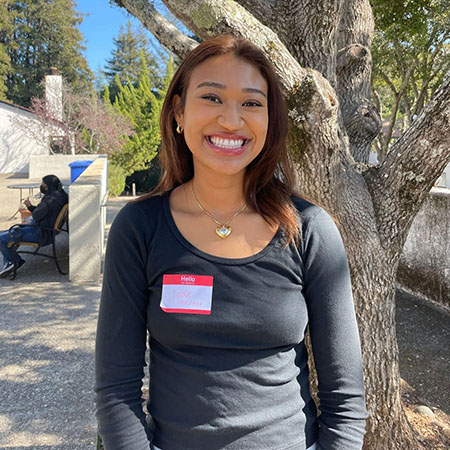Campus News
A road to determination
Jade Goree entered UCSC unsure of her future path—until she found a community with Black Academy and the AARCC.

Jade Goree spent much of her precollegiate life as one of the few ABC (African, Black and Caribbean) students in a predominantly white community. As a Black woman, the negative experience that accompanied that time in her life left her worried that she’d continue without community during her time in college. With the help of UC Santa Cruz’s Black Academy and African American Resource & Cultural Center (AARCC) Goree inevitably found a true community in her later years on campus.
When she first arrived at UCSC, Goree dealt with a major disconnect between her own lived experiences and the surrounding experiences of her peers. She said she felt isolated and without direction, but those feelings helped her decide her educational path in intensive psychology and education where she aimed to tackle issues of mental wellbeing within Black communities. She says after a turbulent four years at UCSC, she left with both experience and purpose.
During her first year at UCSC, Goree joined the Black Academy and discovered the fun and productive environment she was seeking. Motivated by her own experience longing to find community, Goree quickly became a mentor for Black Academy, and guided future first-years along the first steps of college. In Black Academy, Goree felt truly valued as part of a community, and strived to get more involved. She later joined the AARCC.
Goree began as a programming intern for the AARCC in her senior year. Her only regret: not joining sooner. Nevertheless, working with AARCC Program Coordinator Melissa Chimwaza, Goree found a role model and a path to a future career.
“I would’ve worked at the AARCC way sooner if I could have. I felt so validated working there and seeing Black women with power and confidence. It allowed me to see what life could be after college.”
Being from a predominantly white community, she often felt that blackness was portrayed to her as a monolith: negative messages about blackness through mass media and her peers were dominant during her childhood. Goree’s work at the AARCC helped tear down those preconceptions. Working with Black peers, Goree recalls finding an understanding of the multiplicity within race, and a confident future for herself.
Goree now seeks out a goal of education reform with a focus in community psychology, inspired by what she learned about the prison-industrial complex during her studies. Now, Goree works in research at UCSC’s Migration, Identity, & Education Lab while preparing to apply to graduate school, where she can continue her work in academia.
Goree’s current study focuses on the educational experience of Black Muslim college students, with plans for educational reform and Black community wellness in academia.
For current students at UCSC, Goree leaves some advice:
“It can be hard, but find people who look like you or share common interests. Take the initiative!”